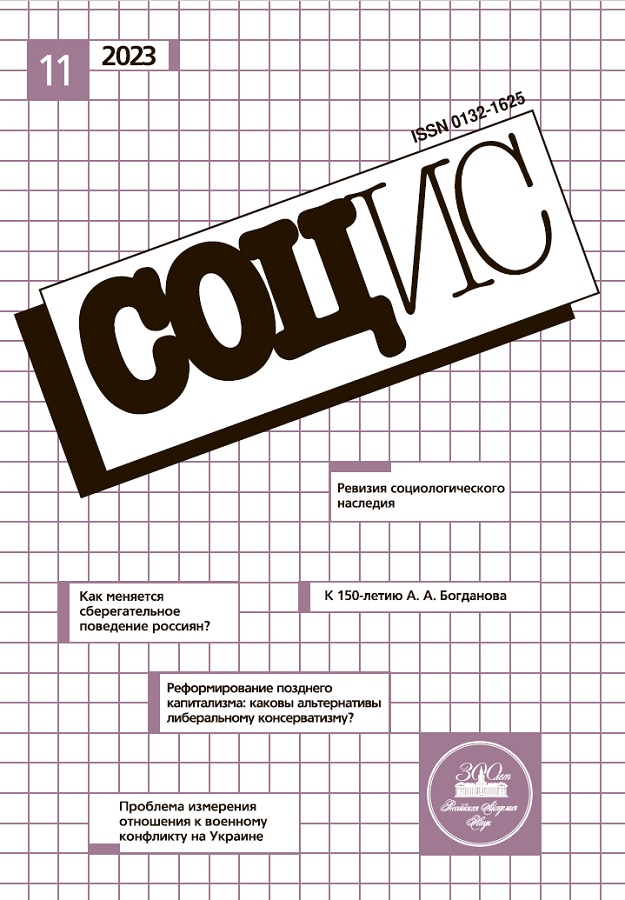Russians’ Perception of the Conflict with Ukraine: Testing the “Spiral of Silence” Hypothesis
- 作者: Zvonovsky V.B.1, Khodykin A.V.2
-
隶属关系:
- Samara State University of Economics
- Social Research Institute
- 期: 编号 11 (2023)
- 页面: 38-50
- 栏目: Articles
- URL: https://cijournal.ru/0132-1625/article/view/661943
- DOI: https://doi.org/10.31857/S013216250028531-7
- ID: 661943
如何引用文章
详细
Russians' attitude towards the Russian-Ukrainian conflict and the very possibility of its quantitative measurement became a subject of heated debates inside Russian sociological community. The most popular argument among professionals who believe that the level of support for the military actions is lower than the recorded values is the "Spiral of Silence" model used by E. Noelle-Neumann to explain people's unwillingness to express unpopular opinions out of fear of facing social disapproval. To test the hypothesis about the spiral of silence we used the method of all-Russian phone survey (N = 1977), repeating the railway test performed by Noelle-Neumann for measuring the willingness of supporters and opponents of the Russian-Ukrainian conflict to discuss it with their political opponents. The results of the research showed that in Russian public opinion about the Russian-Ukrainian conflict there is indeed a spiral of silence, as described by Noelle-Neumann, taking place. It influences both sides of the debate, its effect on the opponents of the conflict being, of course, significantly stronger (21% against 35%). However, opponents of military action have learned better than their opponents to resist the spiral of silence. Therefore, with a possible change in the climate of opinion in Russia, opponents of the military conflict will have greater opportunities than their opponents to promote their own narrative about the Russian-Ukrainian conflict. Along with the railway test, we have conducted research of attitudes towards the Russian-Ukrainian conflict in the respondents’ close circle, in which the share of the conflict supporters turns out to be much lower than among the respondents themselves. This may be an indirect sign of a shift in the samples towards the position of Russian-Ukrainian conflict supporters.
作者简介
Vladimir Zvonovsky
Samara State University of EconomicsRussian Federation, Samara
Alexander Khodykin
Social Research InstituteRussian Federation, Samara
参考
- Гэллап Дж., Рэй С.Ф. Пульс демократии. Как работают опросы общественного мнения / Под ред. Н.П. Попова, А.В. Кулешовой. М.: ВЦИОМ, 2017.
- Звоновский В.Б., Ходыкин А.В. Стратегии адаптации сторонников и противников спецоперации к жизни в её условиях (на примере жителей Самарской области) // Социологический журнал. 2023. Т. 29. № 1. С. 8–35.
- Крокинская О.К. О социологии войны // Палладиум. 2022. № 3. С. 4–13.
- Мертон Р. Социальная теория и социальная структура. М.: ACT: ACT Москва: Хранитель, 2006.
- Мягков А.Ю. Нерандомизированные техники для сенситивных опросов: сравнительный анализ // Социологические исследования. 2023. № 4. С. 28–38.
- Ноэль-Нойман Э. Общественное мнение. Открытие спирали молчания / Общ. ред. и предисл. Н.С. Мансурова. М.: Прогресс-Академия, Весь Мир, 1996.
- Юдин Г.Б. Общественное мнение или власть цифр. СПб.: ЕУ в СПб., 2020.
- Ishchenko V., Zhuravlev O. Imperialist ideology or depoliticization? Why Russian citizens support the invasion of Ukraine // HAU: Journal of Ethnographic Theory. 2022. Vol. 12. No. 3. Р. 668–676.
- Morris J. Public Opinion Still Does Not Exist; War in Ukraine and Dictatorship in Russia Can Help Us Acknowledge That // Russian Analytical Digest. 2023. No. 292. Р. 7–9.
- Тocqueville A. de. Das Alte Staatswesen und die Revolution. Leipzig: Mendelssohn, 1857.
补充文件









